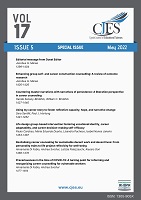Precariousness in the time of COVID-19: A turning point for reforming and reorganizing career counselling for vulnerable workers
Precariousness in the time of COVID-19: A turning point for reforming and reorganizing career counselling for vulnerable workers
Author(s): Annamaria Di Fabio, Andrea SvicherSubject(s): Psychology, Labor relations, Social psychology and group interaction, Health and medicine and law
Published by: Birlesik Dunya Yenilik Arastirma ve Yayincilik Merkezi
Keywords: career counselling; decent work; precarious work; psychology of sustainability; vulnerable workers;
Summary/Abstract: The aim of the present article is to purpose new career counselling perspectives for vulnerable workers in the time of COVID-19 recession. We summarize perspectives on vulnerable workers following a recently advanced taxonomy on the work precarity framework characterized by three broad categories: precarity of work (i.e. fear and concern associated with the continuity of employment), precarity at work (i.e. psychosocial or physical safety at work, including discrimination, harassment, and unsafe working conditions), and precarity from work (i.e. uncertainty and insecurity due to maintaining employment that does not satisfy the basic needs of workers). These three facets of precariousness are frequently experienced by vulnerable workers, and they are related to poorer mental and physical health. The COVID-19 pandemic dramatically exacerbated this trend for vulnerable workers. Thus, suggestions for mitigating the impact of the current crisis are presented. Our perspective deals with the psychology of sustainability, sustainable development, and the psychology of working theory. In this framework, vocational psychologists could reform and reorganize specific career counselling practices for vulnerable workers, promoting sustainable and decent work and inclusivity. This could be achieved by applying four key points. 1) Enrich career counselling interventions with the processes of self-identity, reflection, and reflexivity on what constitutes actual sustainability for vulnerable workers in terms of professional and personal development. 2) Promote the use of an evidence-based methodology in accordance with the accountability principles for the 21st century. 3) Advocate to enrich available services with positive primary preventive strength-based actions and interventions through timely differentiated career counselling strategies. 4) Encourage applied research and practices to find new ways to balance resources with evidence-based efficacy; for example, by using the power of the audience in group-based life design counselling.
Journal: Kıbrıslı Eğitim Bilimleri Dergisi
- Issue Year: 17/2022
- Issue No: Sl. 1
- Page Range: 1477-1494
- Page Count: 18
- Language: English

